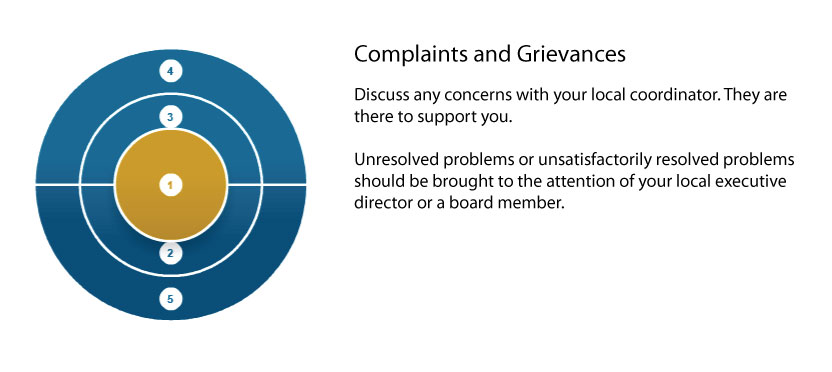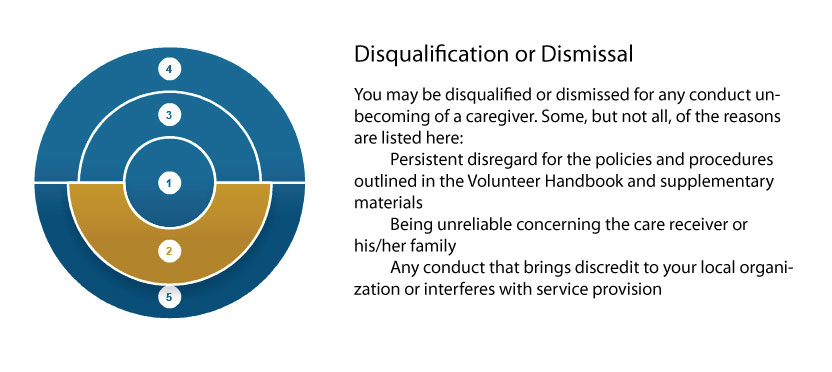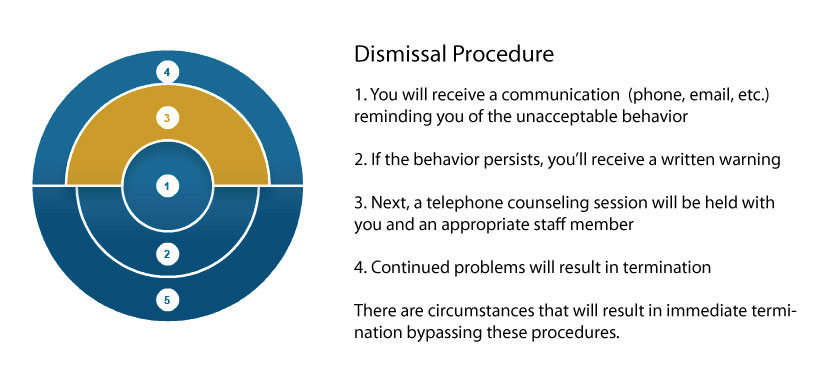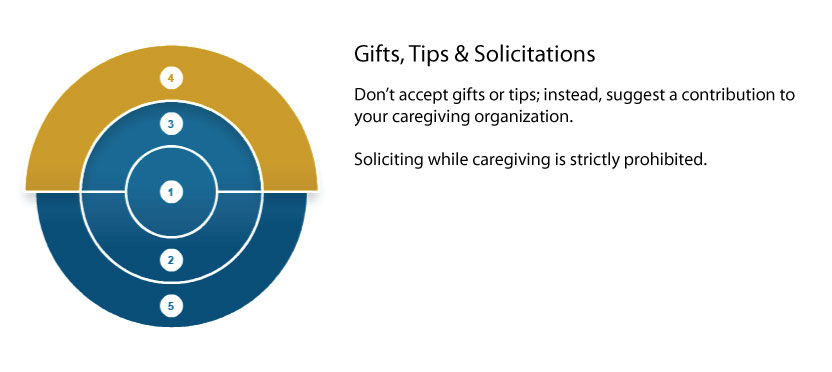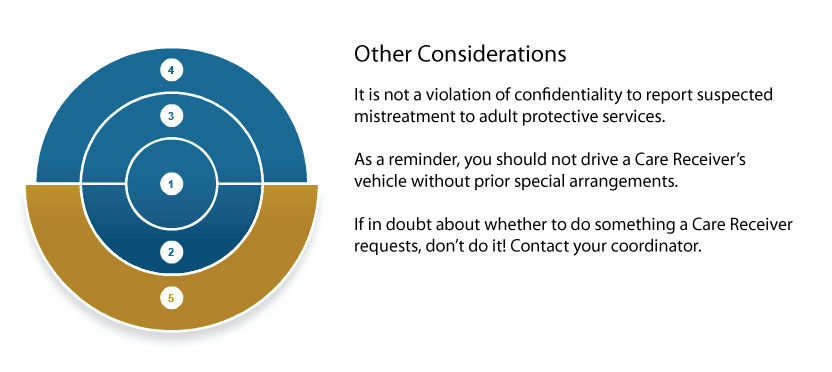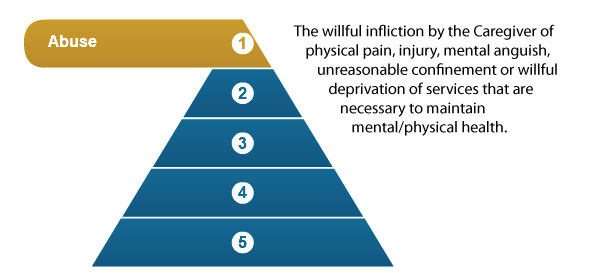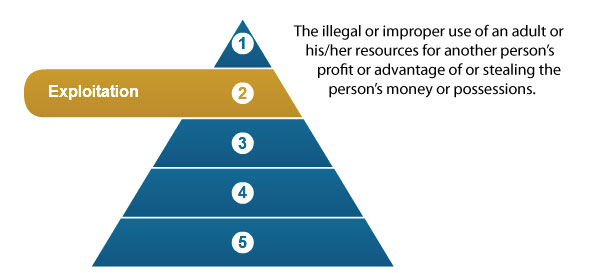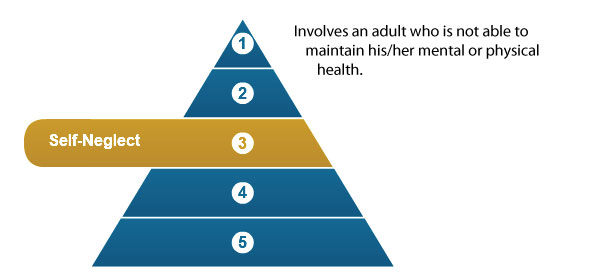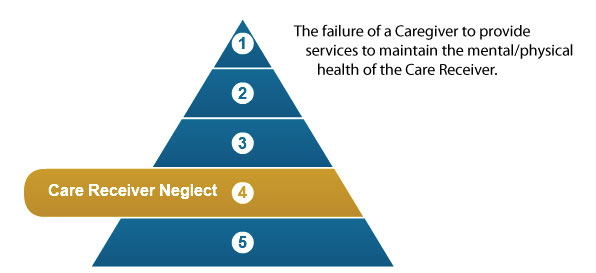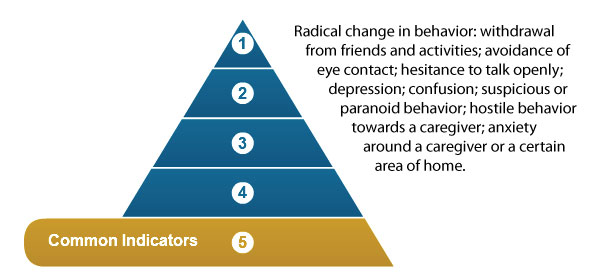Volunteer Basics
Who Can Be a Volunteer Caregiver?
Volunteers that provide direct services for care receivers must:
- Complete a Volunteer Application
- Attend Volunteer Orientation (this on-line orientation counts)
- Provide two personal, non‐family references that support eligibility
- Undergo a criminal background check
- Provide a copy of a valid state driver’s license or other valid ID
- Provide proof of automobile liability insurance
- Meet with a local organization for an interview to complete required Volunteer paperwork
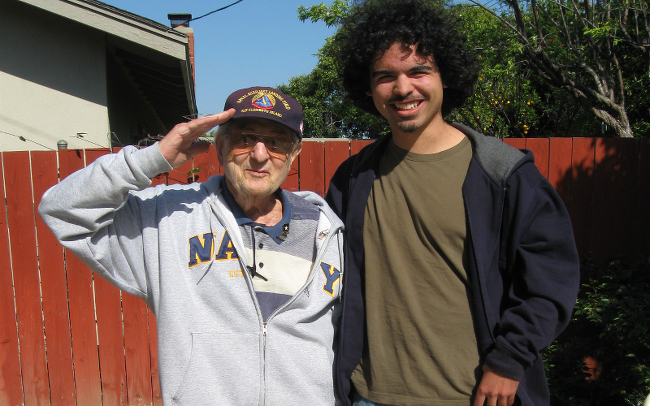
What Is the Role of Friends and Family Members?
Only those who attend the Volunteer Orientation and complete the process outlined above are authorized to provide services to care receivers on behalf of your local organization. These responsibilities cannot be transferred to any other person, such as a family member, co‐worker, or employee.
Volunteer Rights and Responsabilities
What to expect from your Organization
Preparation
You will receive an orientation, including thoroughly explaining your role and providing information about whom you are responsible to and who can answer any questions you may have.
Trust & Respect
You will be treated with respect from all levels of the organization.
You will be trusted with confidential information needed for your assignment.
Role Details
You will be assigned meaningful, worthwhile, work that is not hazardous to your well being.
Your organization’s planning and coordination will ensure your time is used wisely.
We will work together to determine the hours you are available and the services you can provide.
At any time, you may refuse any assignment or request a reassignment.
What your Organization expects from you
Policies & Processes
Follow the policies and procedures as outlined in the Volunteer Handbook.
Submit monthly details of your service.
Keep your organization informed of your current contact information, and updates to you driver’s license and vehicle insurance.
Be punctual and dependable on your assignments.
Honor the confidentiality guidelines.
Promptly report any unusual or unexpected incidents and any mistreatment of your care receiver.
Respect
Notify your coordinator as soon as possible if you aren’t able to fulfill your assignment.
Respect people of different backgrounds, family situations, values and spiritual beliefs.
Your volunteer role does not include witnessing or proselytizing.
Honor the importance of communication with your coordinator and staff by promptly returning phone calls and responding to emails.
Ending Your Assignment
If you need to end your volunteer assignment for any reason, please notify your coordinator and care receiver to ensure a smooth transition.
Other Considerations
Do's & Don'ts
Do perform only assigned duties.
Don’t take sides in the care receiver’s personal matters.
Never loan money to a care receiver.
Don’t accept money for services provided. Care receivers and their families can make a contribution to your local caregiving organization.
It is recommended that you do not give your care receiver your phone number.
Legal Issues
Do not give care receivers any advice on legal, financial, medical, investment, insurance, banking or personal issues.
Do not sign any checks or legal documents on behalf of your care receiver.
You must not be named on any of your care receiver’s bank accounts, insurance policies, or other documents as a co-signer or beneficiary of funds.
You may not be given any form of power of attorney or permission to act on behalf of the care receiver.
Health Issues
Do not provide any personal care services for Care Receivers, including bathing, toileting, and dressing. Your volunteer caregiving organization is not a licensed home health agency.
Do not handle hazardous waste.
Do not lift or transport wheelchairs
Do not count out or administer medications, either prescription or over‐the‐counter. You may only remind Care Receivers to take their medication.
Do not expose Care Receivers, Caregivers or other family members to a contagious disease. If you develop a cold, flu, fever, etc., or become exposed to something contagious, notify your Coordinator immediately.
Setting Boundaries
Do's
Tell the care receiver up front what you can do and how long you can stay.
You should feel comfortable making statements about what you are willing to do or not do.
Understand that it’s okay to say “no” and to say it again if it isn’t heard the first time.
It is okay to turn down a request from a care receiver if they ask you to do something you are not comfortable doing. These situations could be: you do not have time to do something you are asked to do; you feel incapable or inadequate for what you’ve been asked to do; or you are being asked to do something outside of the scope of your role as a volunteer.
Don'ts
It is recommended that you do not give care receivers your phone number.
It isn’t necessary to offer excuses or justifications for saying no.
Don’t cross your boundaries. If you do, it can be very difficult to try to return to the original boundaries and this can be very confusing to the care receiver.
What to do in an Emergency
No One Comes to the Door
Call the care receiver and let the phone ring at least 10 times before hanging up. If there is no answer, try again in a few minutes; make 2‐3 attempts. There are several non‐emergency reasons that may prevent the care receiver from answering the door or phone immediately.
DO NOT ENTER THE HOUSE ON YOUR OWN. In most cases the care receiver has accepted a ride with a friend/family member or forgotten their appointment with you. Call your coordinator if you cannot reach the care receiver.
Suspicious or Alarming Incidents
GO TO A SAFE PLACE, and call 911 immediately.
Other Emergencies
Call 911.
Keep the care receiver comfortable and be as reassuring as possible. Do not attempt to help a fallen individual get up.
Call your coordinator so that they can notify the emergency contact.
All Emergency Relationships
In all emergency situations you will need to stay with the care receiver until the emergency contact or emergency personnel arrive; your responsibility for the care receiver ends when the emergency contact or emergency personnel arrive; and always notify your coordinator once the emergency situation has been handled.
Senior Abuse
At times, volunteers may find themselves in situations in which they see and hear things that are meant to be kept confidential but are important not to ignore for the health and safety of the care receivers. Please note that it is not a violation of confidentiality to report suspected mistreatment to Adult Protective Services.
As a volunteer, you are the eyes and ears of your local program. The local office team is there to support you if you observe that a care receiver might hurt themselves, if someone can hurt the care receiver or if the care receiver can hurt someone else. Check with your local organization for procedures to follow if you need help with these matters.
For more about Adult Protective Services please check out this video. Click Here To View APS Video
